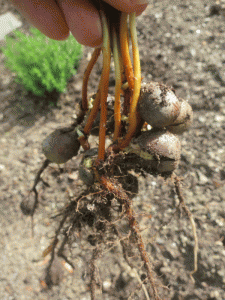
Who Moved My Acorns?
 When weeding a few days ago, I pulled up more than I bargained for. I noticed a tight grouping of healthy leaves off to the side of the garden; they were attractive but obviously not one of our planted perennials. I wrapped my hands around the stems and tugged back and forth a few times, then one final pull and up came a beautiful clump of sprouted acorns. I had never experienced such a weighty set of roots for the airy stems and leaves that were adjoined. For what seemed like an entire minute, I could only stand, looking in awe of what I had discovered. I knew immediately that I had unearthed a food stash from some hard-working squirrel, but what really struck me was the fact that our pretty little flower garden could have easily turned into a full-fledged oak stand in our yard, if I wasn’t the weeding sort.
When weeding a few days ago, I pulled up more than I bargained for. I noticed a tight grouping of healthy leaves off to the side of the garden; they were attractive but obviously not one of our planted perennials. I wrapped my hands around the stems and tugged back and forth a few times, then one final pull and up came a beautiful clump of sprouted acorns. I had never experienced such a weighty set of roots for the airy stems and leaves that were adjoined. For what seemed like an entire minute, I could only stand, looking in awe of what I had discovered. I knew immediately that I had unearthed a food stash from some hard-working squirrel, but what really struck me was the fact that our pretty little flower garden could have easily turned into a full-fledged oak stand in our yard, if I wasn’t the weeding sort.
It got me thinking of how much power and influence a small animal has, just by going about his daily activities. His survival skills teach him to store food, little by little, so that there will be nourishment to consume during leaner months. But does he know that he is also planting the seeds of a forest with his random scattering of acorns? Does he realize the importance he has in this dispersal and it’s role in spreading tree life to new locations (I mean, the tree just can’t get up and walk to a new place to plant little babies!). Talk about teamwork!
Rob Swihart, a wildlife ecologist at Purdue University, says, “Nuts clearly are dependent on either gravity or animals for dispersal. Squirrels are one of the most important species in this regard.” He continues, “Hardwood nut trees, like the black walnut, oak, and hickory, provide food and shelter for a number of other forest species that can’t depend on other types of trees. … [a] shift in the squirrel population could start a chain reaction that could radically alter what’s left of the forest ecosystem.”
Tell me that’s not impressive. I just had not considered the ways in which a squirrel influences our larger environment and I think it’s amazing the way nature finds ways to get things done. We can take these lessons into the workplace, too.
When I uprooted our resident squirrel’s acorns, it gave me reason to reflect on the power of the little things we do in life. Just like squirrels, each of us can — and does — influence bigger issues with what we do — or don’t do — every day. Those routine and sometimes boring activities, can be the most important because they build towards something bigger. They have lasting impact and influence on the whole.
I recently met with a leadership team of a small company. They each wear a lot of hats, are working too many hours, and are generally feeling overwhelmed. (Sound familiar? This is such a common scenario!) As we talked through how they spend their day, they realized that they were busy fighting fires, and not taking enough time to plan and organize what is needed for their long-range objectives. They decided to set up three short meetings a week, each focused on a topic (daily production, strategy, and project planning) as a way to prevent some of the fires from occurring and keep momentum towards the big picture. It seems like a simple plan. But as you can imagine, the first week brought a number of challenges to make these conversations happen. New routines are difficult to implement, no matter how good intentions are. They are working through those obstacles and I hope they continue to do so.
It’s the simplest of everyday tasks that we often don’t give much of a priority to, but they mean the most. We can get consumed with the thought of landing that big customer, achieving that major accomplishment, and reaching that huge profit. However, those aren’t going to happen if we don’t focus on the simple things we need to do on a daily basis.
Where did your bury your acorns today?


Your blog posts are always insightful and so timely that I feel you write them just for me. I wonder if everyone feels that way? I will be putting this one to use next week at our Board meeting.
Fabulous! So glad it’s helpful, Michelle. Thanks for letting us know, too. Good luck with your own acorns!